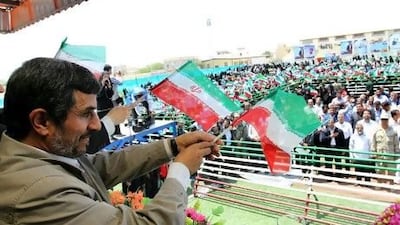Earlier this week, Mohammad Javad Zarif, the Iranian foreign minister, met several key Iraqi politicians in Baghdad, during a period of heightened tensions between the US and Iran. Posting on social media about his visit, Mr Zarif proposed a "regional non-aggression pact". Even to those familiar with Tehran's diversionary methods, it was a hollow offer.
His remarks were the latest incremental move in a sequence of events that began with US president Donald Trump pulling out of the 2015 Iran nuclear deal last year and revoking a series of sanctions waivers.
Additional US warships, B-52 bombers and military personnel have recently been deployed to the Gulf. Separately, there have been attacks on oil facilities in Saudi Arabia and on Emirati, Saudi and Norwegian tankers off the coast of Fujairah. An independent international investigation into these acts is ongoing but on Wednesday in Abu Dhabi, UN national security adviser John Bolton said: "It's clear that Iran is behind the Fujairah attack. Who else would you think would be doing it?"
In response to the increased US presence in the region, Iranian officials have been ratcheting up their rhetoric.
At the same meeting in Iraq earlier this week, Mr Zarif said his country will defend itself against any economic or military challenge and that it will "face these efforts with strength". Earlier this month, Amirali Hajizadeh, an Iranian Revolutionary Guard Corps official, called the increased US presence in the region a "target". The Iranian regime has also said it will withdraw from parts of the 2015 nuclear deal.
When the nuclear agreement was signed nearly four years ago, many wondered what sort of Iran would emerge once sanctions were lifted and revenues began the flow inwards. There was hope that Iranians would see the economic benefits through greater government investment in jobs and infrastructure.
Instead, their economy teeters on the brink and, as Dr Anwar Gargash, the UAE's Minister of State for Foreign Affairs, wrote on these pages earlier this month, Iran continues to play a "disruptive role in the region".
Tehran’s programme of stoking sectarian division and funding its regional proxies has continued unchecked by what the regime always viewed as a narrow and technical nuclear deal, to the detriment of the livelihoods of the Iranian people and the stability of the Middle East.
The islands of Abu Musa and the Greater and Lesser Tunb, which lie a few kilometres off the UAE coastline and are regarded as strategically important waypoints in the Strait of Hormuz, provide the closest reminder of Iran's sustained programme of regional disruption and aggression, as well as its long-standing willingness to ignore international law.
All three were seized by Iran in 1971 as the UAE was formed. The Tunbs had historically belonged to Ras Al Khaimah and Abu Musa to Sharjah, when both emirates were still part of the Trucial States.
In the years since the islands were taken on November 30, 1971, the UAE has sought to settle the issue of Iran's illegal occupation through peaceful methods and arbitration. This country has repeatedly pressed the case directly with international organisations and with Iran itself. The UAE enjoys widespread international support for its case.
For its part, Iran has met this diplomatic outreach with inflammatory rhetoric and has consistently rejected referring the matter to the International Court of Justice.
Seven years ago, Iranian officials declared Tehran's occupation was "permanent and non-negotiable". In January, on a visit to Abu Musa, IRGC official Maj Gen Mohammad Ali Jafari described the island as the "beating heart" of Iran. In March, an Iranian delegate at the Organisation of Islamic Co-operation meeting in Abu Dhabi reacted angrily to the conference's closing statement, which included a reference to ending the occupation of the three islands.
Iran’s actions over Abu Musa tell you everything you need to know about its regional designs.
Strident and unwilling to compromise, it has no apparent strategic vision save for aggression and expansion by proxy. It acts like a wounded animal when challenged about its bad behaviour. It does so because such foreign policy choices serve as a way to divert attention away from its steadily crumbling social contract.
Today marks the convening of an emergency summit in Makkah to assess recent Iranian aggression. Those discussions are almost certain to favour broader dialogue and Arab unity.
On his recent visit to Japan, US president Donald Trump addressed the recent tensions when he said: "I do believe Iran would like to talk".
Dialogue is always constructive but if Iran is intent on dreaming up fantastical regional pacts, it must be part of a broader rapprochement. That is a fanciful wish but anything else, like the illegal seizure of three islands nearly 48 years ago, is an aggressive abuse of trust.
Nick March is an assistant editor-in-chief at The National


